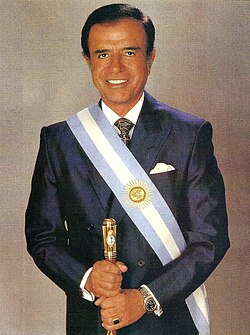
Back كارلوس منعم Arabic كارلوس منعم ARZ Carlos Menem AST Carlos Menem Aymara Карлас Менем Byelorussian Карлос Менем Bulgarian Carlos Menem BS Carlos Saúl Menem Catalan Carlos Menem Czech Carlos Menem Welsh
Carlos Menem | |
|---|---|
 Official portrait, 1995 | |
| 50th President of Argentina | |
| In office 8 July 1989 – 10 December 1999 | |
| Vice President |
|
| Preceded by | Raúl Alfonsín |
| Succeeded by | Fernando de la Rúa |
| National Senator | |
| In office 10 December 2005 – 14 February 2021 | |
| Preceded by | Eduardo Menem |
| Constituency | La Rioja |
| President of the Justicialist Party | |
| In office 28 November 2001 – 11 June 2003 | |
| Preceded by | Rubén Marín |
| Succeeded by | Eduardo Fellner |
| In office 10 August 1990 – 13 June 2001 | |
| Preceded by | Antonio Cafiero |
| Succeeded by | Rubén Marín |
| Governor of La Rioja | |
| In office 10 December 1983 – 8 July 1989 | |
| Vice Governor | Alberto Gregorio Cavero |
| Preceded by | Guillermo Jorge Piastrellini (de facto) |
| Succeeded by | Alberto Gregorio Cavero |
| In office 25 May 1973 – 24 March 1976 | |
| Vice Governor | Libardo Sánchez |
| Preceded by | Julio Raúl Luchesi (de facto) |
| Succeeded by | Osvaldo Héctor Pérez Battaglia (de facto) |
| Personal details | |
| Born | Carlos Saúl Menem 2 July 1930 Anillaco, La Rioja, Argentina |
| Died | 14 February 2021 (aged 90) Buenos Aires, Argentina |
| Resting place | San Justo Islamic Cemetery |
| Political party | Justicialist |
| Other political affiliations |
|
| Spouses | |
| Children | 4, including Carlos Jr. and Zulemita |
| Relatives | Eduardo Menem (brother) Martín Menem (nephew) |
| Signature |  |
Carlos Saúl Menem[a] (2 July 1930 – 14 February 2021) served as the 50th president of Argentina for ten years, from 1989 to 1999, being the longest-serving president since the return to democracy. His presidency is known for pegging the Argentine peso with the US dollar, supporting free trade and privatization policies. He identified as Peronist, serving as President of the Justicialist Party for 13 years (from 1990 to 2001 and again from 2001 to 2003), and his political approach became known as Menemism.[1]
Born in Anillaco, La Rioja, to a Syrian family, Menem was raised as a Muslim,[2] but later converted to Roman Catholicism to pursue a political career.[b] Menem became a Peronist during a visit to Buenos Aires. He was elected governor of La Rioja in 1973, deposed and detained following the 1976 Argentine coup d'état, and re-elected in 1983. He defeated the Buenos Aires governor Antonio Cafiero in the primary elections for the 1989 presidential elections. Hyperinflation and riots forced outgoing president Raúl Alfonsín to resign early, shortening the presidential transition.
Menem's presidency supported the Washington Consensus and tackled inflation with the Convertibility plan in 1991. The plan was complemented by a series of privatizations and was initially a success. Argentina re-established diplomatic relations with the United Kingdom, suspended since the 1982 Falklands War, and aligned itself with the United States. Under his administration, the country participated in the 1991 Gulf War and suffered two terrorist attacks: an attack on the Israeli embassy in 1992 and the 1994 AMIA bombing. The Peronist victory in the 1993 midterm elections allowed him to persuade Alfonsín, by then leader of the opposition party Radical Civic Union, to sign the Pact of Olivos for the 1994 amendment of the Argentine Constitution. This amendment allowed Menem to run for re-election in 1995, winning a second, four-year term. A new economic crisis began, and the opposing parties formed a political coalition, winning the 1997 midterm elections and the 1999 presidential election.[1]
Menem was investigated on various criminal and corruption charges, including illegal arms trafficking (he was sentenced to seven years in prison), embezzlement of public funds (he was sentenced to 4+1⁄2 years to prison), extortion and bribery (he was declared innocent of both charges). His position as senator earned him immunity from incarceration.[3][4]
Menem ran for the presidency again in 2003, but faced with a likely defeat in a ballotage against Néstor Kirchner, he chose to pull out, effectively handing the presidency to Kirchner. He was elected senator for La Rioja in 2005. By the time he died in 2021 at age 90, he was the oldest living former Argentine president.[c] He is regarded as a polarizing figure in Argentina, mostly due to corruption and economic mismanagement throughout his presidency.
Cite error: There are <ref group=lower-alpha> tags or {{efn}} templates on this page, but the references will not show without a {{reflist|group=lower-alpha}} template or {{notelist}} template (see the help page).
- ^ a b Vyas, Kejal (14 February 2021). "Carlos Menem, Argentine President Who Ushered in 'Pizza and Champagne' Era, Dies at 90". The Wall Street Journal. Retrieved 14 February 2021.
- ^ "Carlos Menem" Encyclopædia Britannica
- ^ "Argentina: Ex-president gets 7 years in prison for arms smuggling". CNN. 13 June 2013.
- ^ "Americas | Menem probed over 1995 explosion". BBC News. 16 August 2008. Retrieved 28 October 2010.